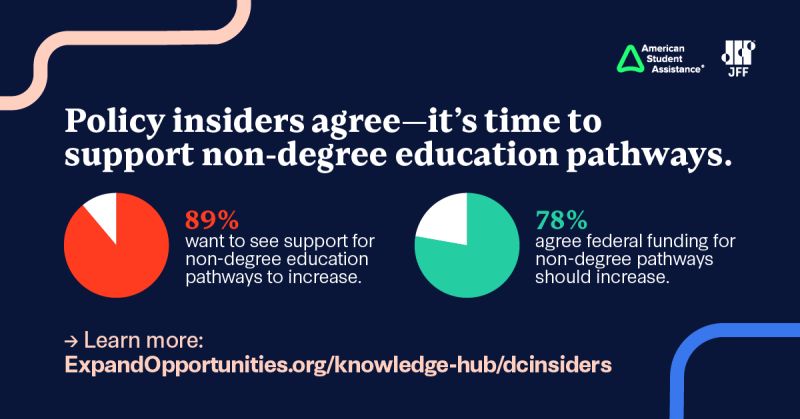Non-Degree Pathways
With the growing momentum for educational pathways beyond traditional college degrees and the landscape of innovative programs and providers more dynamic than ever, scaling these opportunities will require supportive policy and funding. In Non-Degree Pathways: A DC Insider’s Perspective, ASA and JFF partnered with Morning Consult to survey a select but diverse group of policy influencers working in Washington, DC on their perceptions of, support for, and willingness to federally fund expanded educational pathways. The report shows broad support for a robust postsecondary ecosystem and makes specific policy recommendations.
Key findings of the report include:
- There is bipartisan support for expanding non-degree paths. A vast majority of DC Insiders agree that non-degree pathways can diversify options for students (93%) and provide skills to meet employer needs (89%).
- Policy insiders want to see action. Eighty-nine percent of DC Insiders want legislative support for the expansion of non-degree pathways to increase in the next five years and 78% want to see a boost in federal funding for these pathways.
- There is widespread agreement on hiring for skills over degrees. Ninety-six percent of Republicans and 81% of Democrats agree that employers should hire based on skills over degrees.
To ensure that all Americans have equitable opportunities to economic mobility, good-paying jobs, and financial stability, lawmakers must craft and adopt policies that champion postsecondary pathways as diverse as the workers who make up our workforce. The report highlights policy recommendations and opportunities to make a robust postsecondary ecosystem a reality.
Download the report to get the full findings and recommendations.
https://expandopportunities.org/wp-content/uploads/2022/10/ASA_JFF_DC-Insiders_final.pdf
NEW AND EXPANDED educational pathways that prepare individuals for good jobs and careers have the potential to complement traditional degrees. A recent survey of
students and employers found broad support for these non-degree pathways. (See “Degrees of Risk,” a survey commissioned by American Student Assistance and Jobs for the Future).
In this new survey, we find that there is also broad support among Washington, DC-based policymakers. Yet there are also areas of divergence, especially by party affiliation, in support for these expanded pathways. This paper outlines the views of these DC Insiders. For supporting expanded educational pathways and offers recommendations for these policymakers in advancing supportive policies. While students and employers may be open to non-degree options, diverse education-to-career pathways will struggle to gain traction and more widespread acceptance if policymakers do not follow suit with supportive policy and funding. To better understand policymakers’ perceptions
of, support for, and willingness to federally fund non-degree pathways, ASA and JFF commissioned a poll conducted by the market research firm Morning Consult in the spring of 2022. Policy influencers in the Washington, DC area make up the surveyed 156 “DC Insiders.”
For more on methodology and a deep-dive into the survey’s data, click here.
Source: Non-Degree Pathways
https://expandopportunities.org/knowledge-hub/dcinsiders/?utm_campaign=Boost_Post_Website+Visits_Mar+14,+2023,+17:14:49&utm_source=linkedin&utm_medium=paid&hsa_acc=510519655&hsa_cam=627867086&hsa_grp=200376806&hsa_ad=247077496&hsa_net=linkedin&hsa_ver=3

